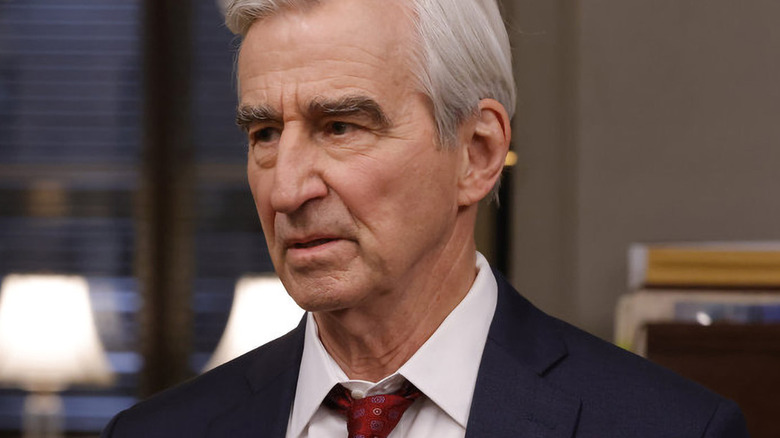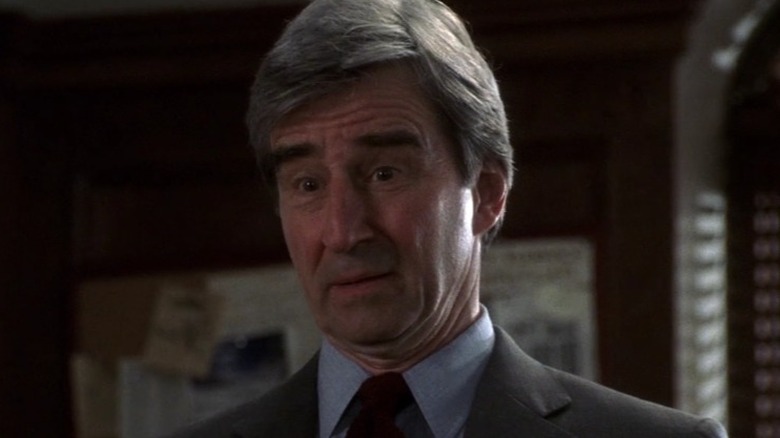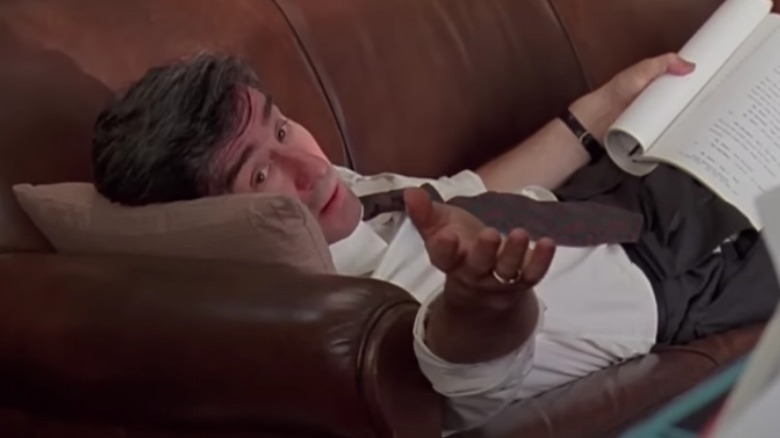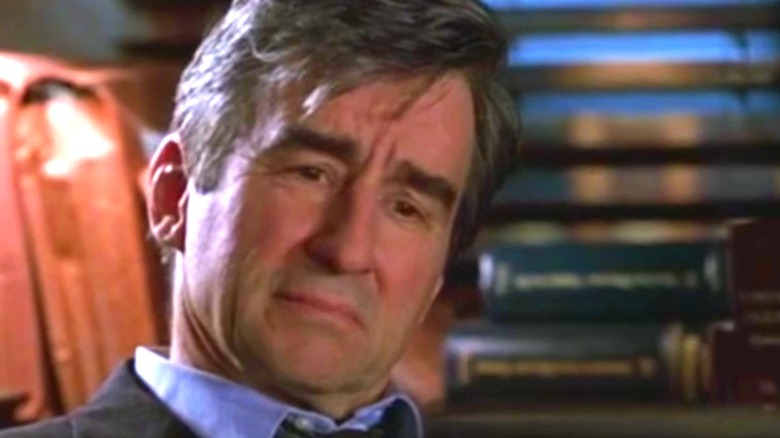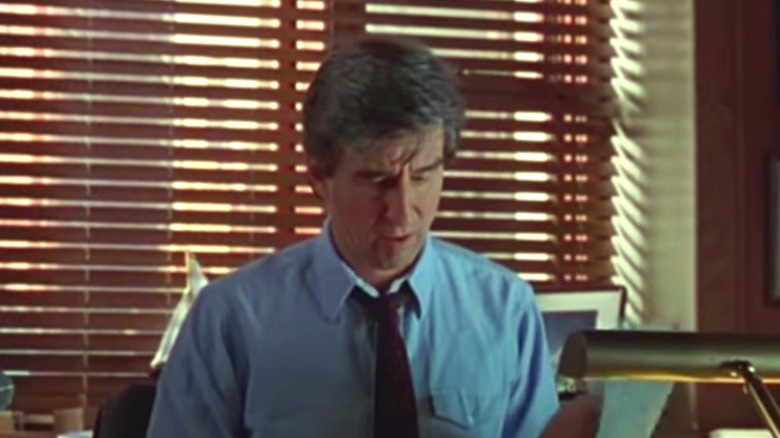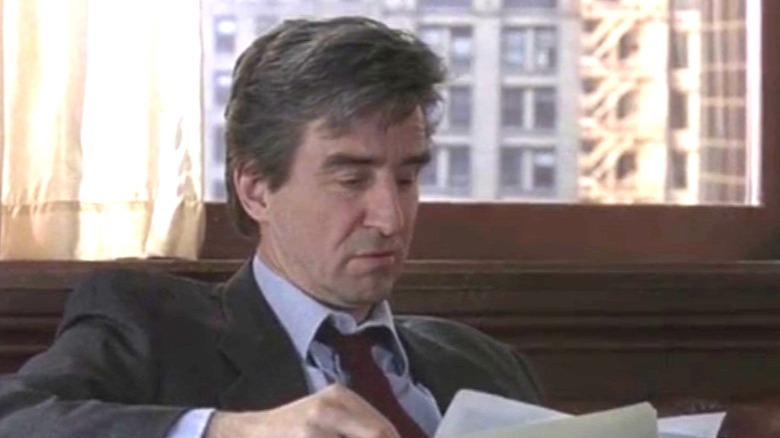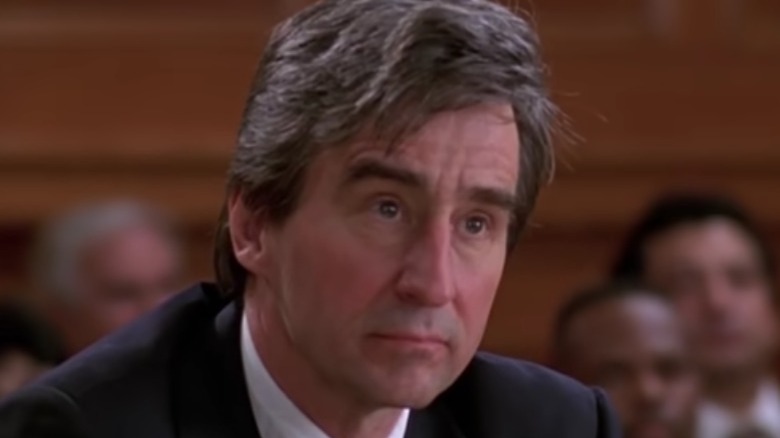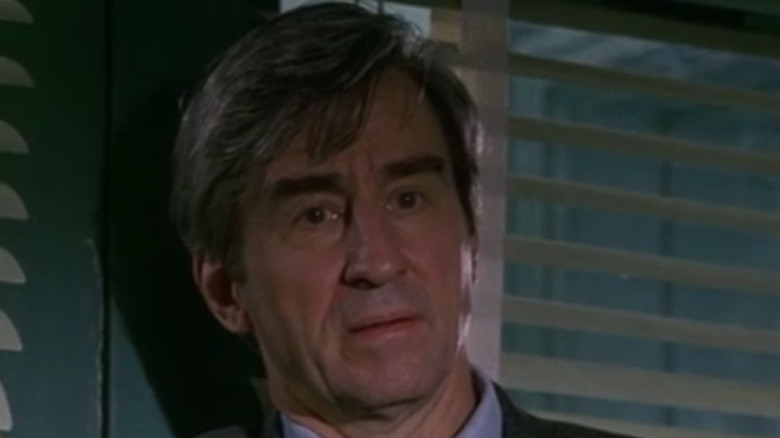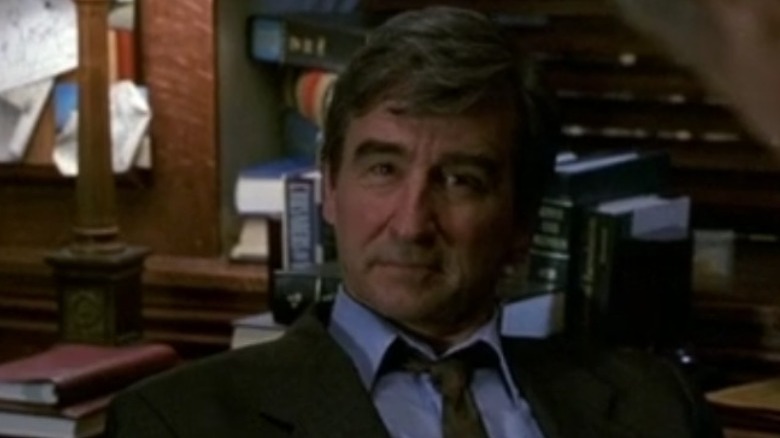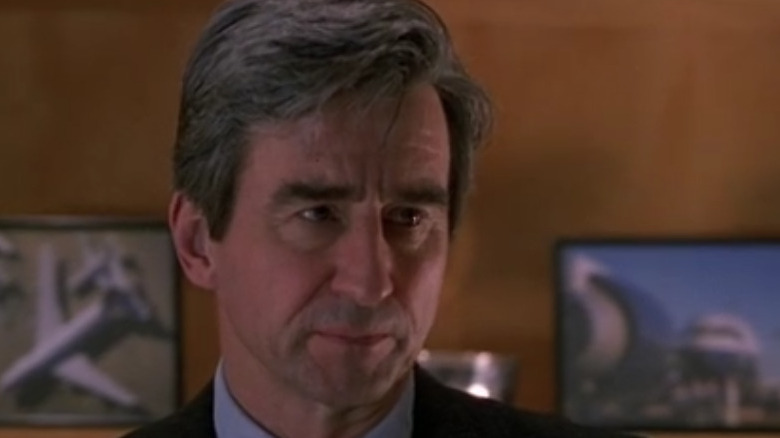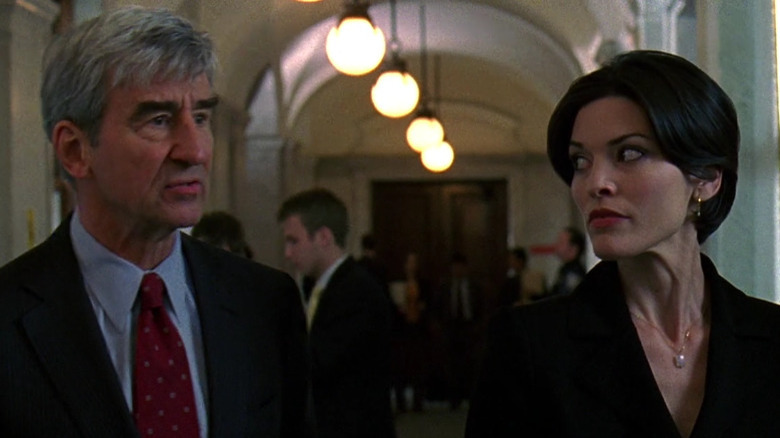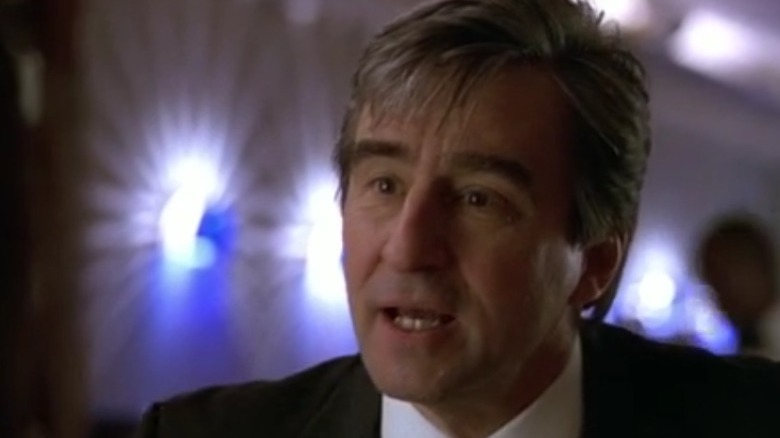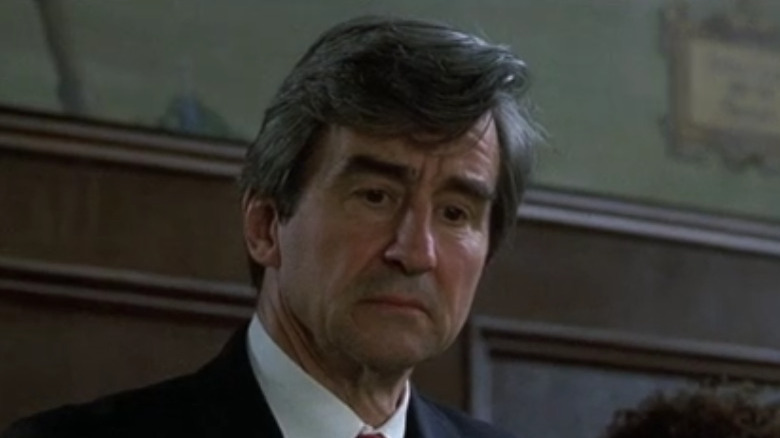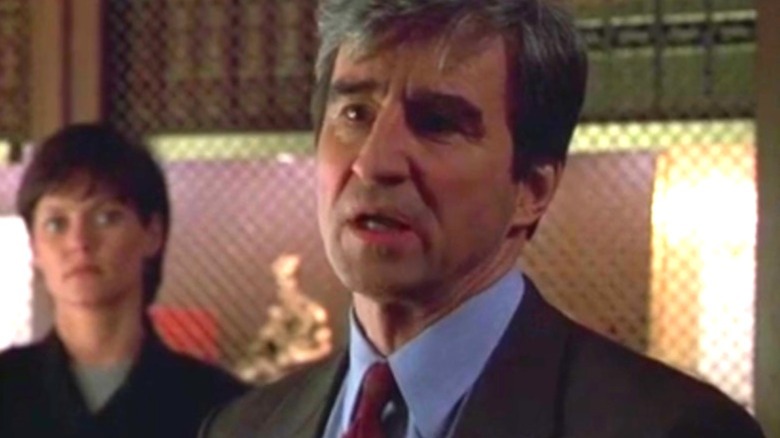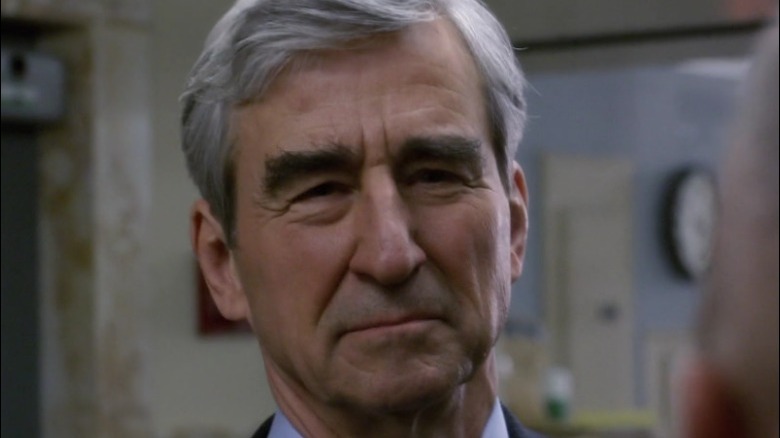Jack McCoy's 7 Best And 7 Worst Moments From Law & Order
The "Law & Order" franchise has seen many characters come and go over the course of its long tenure, but some have enough staying power to become fixtures of their respective series. District Attorney Jack McCoy (Sam Waterston) of the original "Law & Order" is one such character. Even after NBC canceled the show, McCoy retained his popularity among the franchise's viewers and many of its creators. This was made especially clear when "Law & Order" returned to the small screen in 2022: As revealed in an interview with USA Today, creator Dick Wolf never even bothered to imagine a revival without Jack McCoy.
McCoy gets his staying power from being a man with solid principles. This dedication results in his impressive trial record, which provides fans with plenty of memorable victories. However, McCoy's decisions occasionally seem unorthodox, especially to other attorneys. Some may disagree with his choices, but no one can deny his passion and intensity. These are Jack McCoy's seven best and seven worst moments from "Law & Order."
Worst: Bodies
If there's one thing Jack McCoy is guilty of, it's taking bold actions that border on misuses of power. An example of this occurs in the Season 14 episode "Bodies," which features a violent and defiant serial killer named Mark Bruner (Ritchie Coster). Bruner is a criminal any prosecutor would be motivated to catch. Still, McCoy is at his worst in this episode when he takes his prosecutorial efforts a little too far. Bruner refuses to divulge the location of his victims' bodies and finds the prosecution's frustration amusing. Even the idea of a plea deal isn't enough to persuade Bruner to cooperate: He would rather toy with law enforcement than potentially save himself.
In an even more aggravating turn of events, McCoy later discovers that Bruner's attorney Tim Schwimmer (Alexander Chaplin) also knows the location of the victims, and demands answers. However, Schwimmer invokes attorney-client privilege and refuses to help. McCoy responds by going on a crusade to compel him to share what he knows: He has Schwimmer arrested and prosecutes him for obstruction of justice. Although this eventually leads to a resolution, the move doesn't win McCoy any friends in his office. His dogged insistence on pursuing the case against Schwimmer is one of his more questionable decisions in the series.
Best: Second Opinion
Although Jack McCoy is a major player on "Law & Order," he isn't an original cast member. McCoy debuts as executive ADA in the Season 5 premiere "Second Opinion." This episode puts young McCoy's swagger and confidence on full display, even as he meets his brand new ADA, Claire Kincaid (Jill Hennessy). A scandalous part of McCoy's backstory is introduced when Kincaid casually questions him about having affairs with his previous assistants, which gives viewers more insight into the newly-minted character. It also foreshadows the relationship that eventually unfolds between McCoy and Kincaid.
In addition to introducing McCoy, this episode raises important questions about quality-of-life concerns for terminally ill patients, especially women. The two join forces to prosecute Dr. Nancy Haas (Jan Maxwell), who offers alternative breast cancer treatments with questionable results. From the beginning of his involvement, McCoy proves that he won't shy away from a debate about principles. He butts heads with DA Adam Schiff (Steven Hill), but in the end, Dr. Haas receives a 15 year sentence. McCoy makes a solid first impression in this episode, which showcases the no-nonsense bravado that eventually becomes his hallmark.
Worst: Ramparts
Season 9's "Ramparts" features Jack McCoy doing something he's known for: letting his ambition cloud his judgment. Detectives discover a police cover-up dating back three decades, and McCoy is determined to get to the bottom of it. It all centers around a murder case from the 1960s involving a student protester, which drives McCoy into a passionate state. He makes his views on student uprisings abundantly clear and isn't afraid to argue his point. He also openly criticizes the police department's handling of the case, refusing to see their side of the situation. McCoy even slams ADA Abbie Carmichael (Angie Harmon) for not understanding the social climate in which the murder occurred, due to her age.
McCoy and Carmichael proceed to debate the police tactics used at the time, and though Carmichael makes some valid points, McCoy sticks to his opinion. His combativeness paints him in a very unflattering light. Later, his insistence that the police department must unseal confidential case files worsens matters. Although he can be very charming and persuasive in a positive way, McCoy chooses to be stubborn and aggressive at every turn in this episode. It gets so bad, viewers have to wonder if winning the case is really worth all this conflict.
Best: Aftershock
Sometimes, the best character development occurs in a series' quietest moments. Season 6's "Aftershock," undoubtedly one of the best season finales in "Law & Order," offers audiences a great example. Jack McCoy, ADA Clarie Kincaid, Detective Rey Curtis (Benjamin Bratt), and Detective Lennie Briscoe (Jerry Orbach) attend an execution. In trying to make sense of what they witness, they confront ethical questions about capital punishment. "Aftershock" strays from the typical "Law & Order" format, with no active case to prosecute. This lack of action leaves plenty of room for Jack McCoy to put aside his usual aggression and display a more subdued side.
"Aftershock" does more to humanize the hot-headed prosecutor than any previous episode. Although he argues with Kincaid after the execution and buries himself in his work, it's clear he's struggling in his own way. McCoy also reveals more details about his family history, which makes it easier to understand his work ethic and strong feelings about justice. The tragic ending to the episode foreshadows even more personal turmoil for McCoy, especially his struggle to come to terms with Kincaid's death.
Worst: Precious
Jack McCoy is no stranger to controversy, but his behavior in Season 5's "Precious" is outlandish, even for him. This episode's investigation involves Eileen Willick (Julie Boyd), a mother who harms her children to get attention, which puts McCoy immediately on the warpath. He only focuses on his need to seek justice for these children, and belittles all extenuating circumstances, including Eileen's mental health. McCoy pressures her husband Marty (Kevin O'Rourke) to turn against her, but Marty refuses to abandon his wife. McCoy's disdain for this decision is evident, and his harsh treatment of the husband and wife only escalates.
After a hung jury trial, McCoy demands the judge compel Eileen to become sterilized in exchange for a plea deal. This request is wildly unreasonable, and the judge responds by granting a motion to remove McCoy from the case. However, he still refuses to give up on getting Eileen behind bars, and again confronts Marty. Eventually, Marty confesses to witnessing Eileen harm a child, which seals her fate. Although his colleagues are satisfied with the case's outcome, McCoy's blatant disregard for the complex factors that led to the crime isn't one of his finest moments.
Best: Double Down
Jack McCoy pulls off some impressive wins throughout his "Law & Order" tenure, and Season 7's "Double Down" features one of the most satisfying. McCoy finds himself in a difficult position when he bargains with armed robber Henry Harp (Luke Reilly). Harp all but extorts an immunity deal from the prosecution by offering information that could solve a kidnapping. McCoy comes under fire for considering the offer because Harp murdered three people while robbing a liquor store, including an off-duty police officer.
Much to the dismay of the police department, McCoy agrees to the deal — but he has a solution in mind that will appease everyone. It requires some legal acrobatics, which put his adaptability and quick wit on full display. McCoy isn't permitted to prosecute Harp for murdering the police officer, but a post-trial court hearing gives him the green light to charge him for the murder of one of the other victims. Some members of the police department aren't entirely happy with McCoy's tactics, but his expert use of the law is undeniably admirable.
Worst: Patsy
Season 10's "Patsy" sees Jack McCoy let his temper get the best of him in an unlikely place: the courtroom. While he often rages against those who oppose him in the DA's office or judges' chambers, it's rare to see him completely lose his cool during an actual trial. This episode's case involves a bizarre set of circumstances: Police find a mysteriously unconscious woman in her apartment and later discover a man named Ken Taylor (Sebastian Roche) may have attacked her. Even more puzzlingly, Taylor might have murdered the unconscious woman's sister.
Taylor insists that someone is trying to frame him for both crimes. McCoy doesn't believe Taylor and attempts to discredit him in front of a grand jury. During his trial, Taylor's lawyer presents evidence that the comatose woman was behind these crimes, including her sister's murder. While he makes his closing arguments, McCoy becomes thoroughly enraged and begins ranting about the perceived ridiculousness of the proceedings. The judge repeatedly orders him to stop speaking and sit down, making McCoy even angrier. This outburst is entirely unprofessional, and results in a mistrial and a contempt charge for McCoy.
Best: Killerz
Jack McCoy is never afraid to take a definitive stance on an issue, especially if he believes it's for the common good. Some of his most shining moments occur when he's the only prosecution member willing to take an unpopular stand. Season 10's "Killerz" includes a memorable example of this behavior. Here, the team tackles a complicated case involving a 10-year-old girl named Jenny Brandt (Hallee Hirsh) who stands accused of murdering a little boy. Jenny exhibits multiple troubling behaviors during interviews with detectives and psychiatrists, and even puts her defiant behavior on display in court.
Although nearly everyone involved in this case believes she deserves leniency due to her age, McCoy staunchly opposes this notion. He champions sending her to a mental health facility, citing concerns that Jenny will kill again. Due to her age, McCoy believes she has the potential to become a prolific serial killer if her behavior goes unchecked. He gives an impassioned speech to the court, begging the judge to consider the potential threat Jenny poses to society. Although McCoy technically loses, his eloquent plea for the good of the community is a highlight of his conduct.
Worst: Mad Dog
Jack McCoy's pursuit of righteousness sometimes borders on obsession, as is the case in Season 18's "Mad Dog." In this episode, McCoy rails against the prison system after the parole board grants serial rapist Lewis Darnell (Burt Young) early release. As a result, Darnell only serves 18 years of his 30 year sentence, which infuriates McCoy. However, Darnell soon stands accused of committing a new murder, and McCoy is determined to see him convicted at all costs — including his position as executive ADA.
McCoy first crosses a line by doggedly searching for a legal loophole that will allow him to convict Darnell, even with an overwhelming lack of evidence. He also tries to have Darnell committed to a mental health institution, and even has his neighborhood littered with wanted posters. McCoy goes so far as to put detectives Lennie Briscoe and Rey Curtis at risk when they're accused of strong-arming Darnell to carry out McCoy's agenda. Finally, when Darnell attacks yet another victim, his own daughter ends his life to protect her community. Nobody truly wins the case in this episode, so McCoy jeopardizes his career for no good reason.
Best: Talking Points
Season 17's "Talking Points" revolves around the attempted murder of an outspoken political pundit named Judith Barlow (Charlotte Ross). She gives a controversial speech at a university event, where a young student is killed. Detectives soon uncover the deceased's friendship with fellow student Malcolm Yates (Louis Cancelmi), who has Parkinson's disease. The attempted murder appears to be motivated by Barlow's stance against stem cell research, an initiative that could help find a cure for Parkinson's. However, McCoy does not buy this excuse and is determined to prosecute despite the uphill battle he faces against Yates' defense team.
To make himself look more sympathetic, Yates stops taking his medication before the trial. This decision makes his Parkinson's symptoms more pronounced, which profoundly impacts the jury. Despite this, McCoy stays the course and picks apart Yates' side of the story during a brilliant cross-examination. Many lawyers would be intimidated by having to question Yates about his condition, but McCoy manages to avoid being offensive and pokes crucial holes in Yates' defense. He also goads Yates into an agitated outburst, which paints him in a very negative light. In the end, McCoy's expert tactics score a win for the prosecution.
Worst: Trophy
Jack McCoy has an impressive case record, but it does include a few unfortunate mistakes. One of these mistakes arrives in Season 6's "Trophy," which explores a case involving a prolific serial killer. At first, detectives believe they have uncovered a copycat killer emulating Andrew Dillard's (Wesley Rice) signature style. However, the ongoing investigation reveals a more horrible truth: Dillard is innocent, and the actual serial killer, Simon Brooks (Isiah Whitlock Jr.), has been roaming the streets for years. Brooks was inactive for a while as he received treatment for his mental illness, but he resumed killing once care was discontinued.
McCoy later vents about his massive mistake to ADA Kincaid, who is unsympathetic. She openly admits that McCoy has done some questionable things in his past. DA Adam Schiff also wonders how McCoy and his former partner Diana Hawthorne (Laila Robins) could have made such a misstep. This case gives McCoy an excellent opportunity to take responsibility for his past errors and make things right. But instead, he drags both Hawthorne and Kincaid into the fray, taking full advantage of his relationships with both women. Schiff eventually suspends McCoy after Andrew Dillard files a lawsuit against the DA's office, claiming prosecutorial misconduct. "Trophy" is a cautionary tale about letting the desire to win cloud one's judgment.
Best: Blood Money
Advocating for victims and their families is an integral part of being a prosecutor. McCoy takes this portion of his job very seriously. One of the best examples of this occurs in Season 10's "Blood Money," which kicks off with the death of a retired insurance salesman and eventually reveals a scam that targets Holocaust survivors. Pietro Grimaldi sold life insurance policies to thousands of European Jews before the Holocaust began, then refused to honor the policies when victims' families tried to collect on them. The investigation reveals that someone murdered Grimaldi to keep him from providing damning testimony against his employer.
Jack McCoy could easily secure a conviction for Grimaldi's murder and wash his hands of the case. Instead, he decides to pursue dozens of grand larceny charges against Grimaldi's employer, who sanctioned the insurance fraud. Most notably, McCoy calls a witness who lost most of his family in the Holocaust, which leads to a powerfully moving testimony. In the end, McCoy's quest for justice leads to a very satisfying conclusion: Some of the families of the Holocaust victims will indeed receive payouts from the life insurance policies.
Worst: Under The Influence
ADA Kincaid's death in an accident involving a drunk driver is a pivotal tragedy in Jack McCoy's life. The accident brings the pair's longstanding professional and romantic relationship to an abrupt end, which lingers painfully with McCoy for a long time. This pain makes Season 8's "Under the Influence" one of the very best "Law & Order" episodes – but it also highlights some of McCoy's worst tendencies. "Under The Influence" centers around a case involving a drunk driver who tragically killed three people in an accident. This is an instant reminder of Kincaid's death for McCoy, and the opening of old wounds quickly clouds his judgment.
McCoy's prosecutorial efforts border on malicious as he pushes for a first-degree murder conviction. What's worse, the judge presiding over the case agrees with McCoy's overzealous stance. McCoy and his current assistant, ADA Jamie Ross (Carey Lowell), have very different opinions about this case, which causes tension. McCoy even accuses Ross of thinking more like a defense attorney than a prosecutor. McCoy's conduct in this episode is far more vindictive than it is impartial, which is a poor example of how a prosecutor should behave.
Best: Rubber Room
Season 20's "Rubber Room" is a fitting finale for the pre-reboot "Law & Order" series, featuring a complex case that successfully provides satisfying resolutions to the recurring characters' personal stories. Most vividly, beloved mainstay Lt. Anita Van Buren (S. Epatha Merkerson) receives excellent news about her cancer treatment, which is followed by a fundraising event in her honor. But of course, the finale wouldn't be complete without a memorable Jack McCoy moment.
Although he appears late in the episode, McCoy's interaction with defense lawyer Mr. Kralik (Paul Schulze) is a true highlight. Passions boil as they argue over whether or not a teacher should ignore her union rep's advice and talk to the prosecution. In true Jack McCoy fashion, the DA doesn't back down or take no for an answer. Instead, he insists on cooperation. When Mr. Kralik continues to argue with him, McCoy pulls no punches in laying out the potential consequences. "Get out of my way," he utters, perfectly summing up his approach to pursuing justice.
